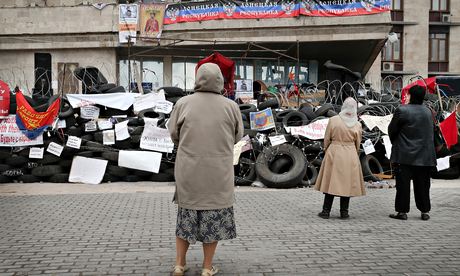Ukraine crisis strains family ties in divided Donetsk
Two cousins represent two sides of bitter debate over future of mainly Russian-speaking province

People stand outside the occupied regional administration building in Donetsk. Photograph: Scott Olson/Getty Images
Alexander, 20, has spent almost every day for the past two weeks volunteering at the occupied Donetsk regional administration, where pro-Russia protesters have declared a "Donetsk People's Republic" and refused to leave the building until they hold a referendum on independence from Kiev.
Igor, 28, calls himself a Ukrainian nationalist and supports Svoboda, the parliamentary party that many here see as a fascist organisation aiming to crack down on Russian speakers in the country's east.
Over pizza and beer one night recently, the cousins began arguing bitterly as soon as talk turned to politics.
"We can't deny that the Donetsk People's Republic is an illegal formation," Igor said.
"We just want independence," Alexander retorted.
"What will independence give us?"
"It's a good decision for us Donetsk residents, economically and otherwise. The Kiev regime also came to power illegally."
In the ensuing hour-long debate, the only kind words the Shilovs shared came when Igor passed Alexander a knife after the younger cousin burned himself on some cheese dripping off a pizza slice.
Three-quarters of the inhabitants of Donetsk province, which is part of the Donbass coal-mining region that stretches into Russia, speak Russian as a native language, and many have a positive view of their larger neighbour thanks to longstanding economic and cultural ties.
But surveys by centres in both Donetsk and Kiev show divided opinions on the region's future, and rival pro-Russian and pro-Ukrainian rallies last month ended in clashes, killing one. Political differences have grown sharper in the past two weeks as pro-Russian protesters and militia have taken over government buildings in at least 10 cities in eastern Ukraine, splitting friends and relatives.
A poll by the Kiev International Institute of Sociology found that 46% of those surveyed in eight southern and eastern provinces thought the Euromaidan protests in Kiev that ousted Viktor Yanukovich as president were an "armed coup d'état organised by the opposition with the help of the west".
But 54% thought Russia was "illegally interfering in Ukraine's internal affairs". When asked whether they supported the "actions of those who seize administrative buildings in your region with weapons in hand", 72% of Donetsk residents said no.
In another survey, by the Donetsk Institute for Social Research and Political Analysis, 18.6% of those polled opposed changes to the government structure, 47% wanted federalisation or at least more economic independence from Kiev, 27% wanted to join Russia in some form, and 5% wanted to become an independent country.
Many of Alexander and Igor's disagreements echoed the contrasting narratives peddled by Russian and Ukrainian media, a difference so stark that many here describe it as an information war.
No comments:
Post a Comment